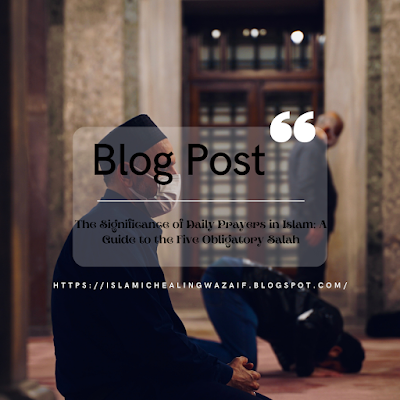The Significance of Daily Prayers in Islam: A Guide to the Five Obligatory Salah
Prayer is one of the five pillars of Islam, and it is considered to be one of the most important acts of worship for Muslims. Daily prayers, or Salah, provide a way for believers to connect with Allah and cultivate a sense of peace and contentment in their daily lives.
There are five obligatory prayers in Islam, which are performed at specific times throughout the day. These prayers are:
Fajr: performed before sunrise, it marks the beginning of the day and serves as a reminder to start the day with a pure heart and good intentions.
Dhuhr: performed at midday, it serves as a reminder to take a break from work and seek refuge in Allah.
Asr: performed in the late afternoon, it serves as a reminder to seek guidance and direction from Allah in all aspects of life.
Maghrib: performed just after sunset, it serves as a reminder to reflect on the day and seek forgiveness for any mistakes made.
Isha: performed after dusk, it serves as a reminder to seek protection and blessings from Allah as one prepares to sleep.
In addition to these five obligatory prayers, there are also several recommended prayers that can be performed, including the Dawn prayer (Tahajjud) and the Friday congregational prayer (Jumu'ah).
The benefits of daily prayer are many. It helps to cultivate a deeper connection with Allah, and it provides a sense of spiritual grounding and direction in daily life. Additionally, prayer helps to purify the heart, dispel negative emotions, and bring a sense of peace and contentment to the soul.
In the practice of daily prayers, there are various physical and mental acts that are performed, including standing, bowing, prostrating, and reciting specific verses from the Quran. These physical acts serve as a way of submitting oneself to Allah and surrendering to His will.
The mental aspect of prayer involves focusing the mind on the words being recited, and meditating on their meaning. This helps to cultivate a sense of humility and reverence for Allah and serves as a reminder of His power and greatness.
In addition to the five obligatory prayers, there are also various additional acts of worship that can be performed during the day, such as making dua (supplication), reading the Quran, and performing good deeds. These acts serve as a way of deepening one's connection with Allah, and of seeking His blessings and guidance in all aspects of life.
It is important to note that the practice of daily prayers is not just a personal act of worship, but it is also a communal act of worship. The Friday congregational prayer (Jumu'ah) is a prime example of this, as it brings together the community to pray and reflect on the teachings of Islam.
Finally, it is important to remember that the benefits of daily prayer go far beyond the physical and mental acts of worship. Regular prayer helps to cultivate a deeper sense of spiritual connection with Allah, and it provides a sense of comfort and peace in times of difficulty and stress. So, make a commitment to incorporate the five obligatory prayers into your daily routine, and experience the many blessings that come from a strong connection with Allah.
Conclusion:
In conclusion, daily prayer is an essential aspect of Islamic worship, and it provides a powerful tool for spiritual growth and development. Whether you are new to prayer or a seasoned practitioner, make a conscious effort to incorporate the five obligatory Salah into your daily routine, and experience the many benefits that come from a strong connection with Allah.












0 Comments